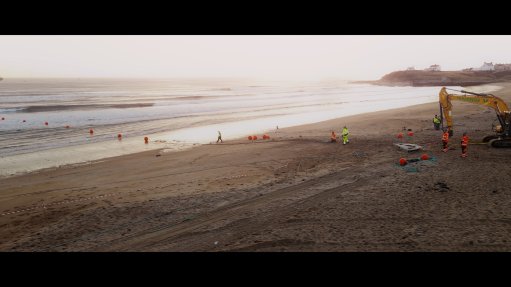Weak economy weighed on construction in the first quarter – ACI
The Afrimat Construction Index (ACI) declined to a level of 103.7 in the first quarter of this year, down from 117.3 in the fourth quarter of 2023 and 105 in the first quarter of 2023.
Economist Dr Roelof Botha, who compiles the ACI on behalf of JSE-listed midtier mining and materials company Afrimat, says the country's weak economic growth in the first quarter was evident in the construction sector, with eight of the ten constituent indicators of the ACI having recorded year-on-year declines, and the ACI growth rate having slipped below zero.
The 1.3% year-on-year decline in the ACI compares with the annualised 0.5% increase in the country’s GDP. However, the year-on-year decline of almost 9% in the construction sector’s value-added is a concern, says Botha.
“On the upside, the decrease was somewhat offset by the 10.1% year-on-year increase in the value of wholesale sales of construction materials,” he points out.
Nevertheless, while the year-on-year increase of 14 000 jobs in the sector is encouraging, the total employment figure of just more than 1.2-million is still 128 000 below the number of jobs that existed in the first quarter of 2020.
“The lethargy in the construction sector has been caused by a combination of factors, including the high cost of capital in South Africa, with the current prime overdraft rate of 11.75% a full 175 basis points higher than before Covid-19.”
Lending rates are at their highest level in 14 years, despite the consumer price index having been within the South African Reserve Bank (SARB) target range for inflation of 3% to 6% for 11 straight months and the long-standing absence of demand inflation in the economy, Botha notes.
The lack of growth in the sector is also owing to the fact that dozens of municipalities in South Africa have been dysfunctional for many years, which prevents them from accessing conditional National Treasury grants earmarked for infrastructure upgrades.
Additionally, fiscal constraints owing to weak economic growth have prevented any significant increase in construction-related capital expenditure in the 2024/25 National Budget, he adds.
Further, construction activity is also traditionally quite subdued during the first three months of the year, owing to a lengthy summer holiday period and the Easter holidays, Botha points out.
“There may also have been a measure of hesitancy with new construction projects because of the uncertainty surrounding the elections, especially owing to early indications that parties with populist agendas would garner substantial votes.”
However, the two largest political parties appear to be committed to maintaining the Constitution and the principle of private property rights, Botha says.
“South Africa has now joined the majority of democracies where executive governance will in future be based on some form of cooperation between two or more parties, either through a coalition or a government of national unity,” he adds.
Meanwhile, in terms of the prospects for the construction sector for the rest of the year, Botha is confident that the consistent decline in the Consumer Price Index will force the SARB’s hand to lower interest rates at the July meeting of the Monetary Policy Committee, especially now that the European Central Bank has cut its key rate from 4% to 3.75%.
“Significantly lower interest rates are required to incentivise capital formation and construction activity and the proverbial ball should start rolling soon,” he says.
While the construction sector has remained relatively weak, the recent results achieved by Afrimat itself were outstanding owing to the company's collective efforts, comments Afrimat CEO Andries van Heerden.
Afrimat's bulk commodities segment was responsible for the bulk of the profitability, although the construction materials division also increased its revenue owing to increased demand from the road and rail industries, he says.
In terms of market demand in the construction space, efforts by the South African National Roads Agency and maintenance by State-owned Transnet are showing positive momentum demand for aggregates in particular, further supported by large road maintenance projects in KwaZulu-Natal, Van Heerden says.
“The integration of Lafarge brings Afrimat full circle to its origins in quarrying, and opens up new opportunities for the group. The additional products, together with a broader national footprint, are expected to positively alter the delivery capability of Afrimat and the construction materials segment. This project is anticipated to deliver significant results in the future,” he said.
Article Enquiry
Email Article
Save Article
Feedback
To advertise email advertising@creamermedia.co.za or click here
Comments
Press Office
Announcements
What's On
Subscribe to improve your user experience...
Option 1 (equivalent of R125 a month):
Receive a weekly copy of Creamer Media's Engineering News & Mining Weekly magazine
(print copy for those in South Africa and e-magazine for those outside of South Africa)
Receive daily email newsletters
Access to full search results
Access archive of magazine back copies
Access to Projects in Progress
Access to ONE Research Report of your choice in PDF format
Option 2 (equivalent of R375 a month):
All benefits from Option 1
PLUS
Access to Creamer Media's Research Channel Africa for ALL Research Reports, in PDF format, on various industrial and mining sectors
including Electricity; Water; Energy Transition; Hydrogen; Roads, Rail and Ports; Coal; Gold; Platinum; Battery Metals; etc.
Already a subscriber?
Forgotten your password?
Receive weekly copy of Creamer Media's Engineering News & Mining Weekly magazine (print copy for those in South Africa and e-magazine for those outside of South Africa)
➕
Recieve daily email newsletters
➕
Access to full search results
➕
Access archive of magazine back copies
➕
Access to Projects in Progress
➕
Access to ONE Research Report of your choice in PDF format
RESEARCH CHANNEL AFRICA
R4500 (equivalent of R375 a month)
SUBSCRIBEAll benefits from Option 1
➕
Access to Creamer Media's Research Channel Africa for ALL Research Reports on various industrial and mining sectors, in PDF format, including on:
Electricity
➕
Water
➕
Energy Transition
➕
Hydrogen
➕
Roads, Rail and Ports
➕
Coal
➕
Gold
➕
Platinum
➕
Battery Metals
➕
etc.
Receive all benefits from Option 1 or Option 2 delivered to numerous people at your company
➕
Multiple User names and Passwords for simultaneous log-ins
➕
Intranet integration access to all in your organisation





















